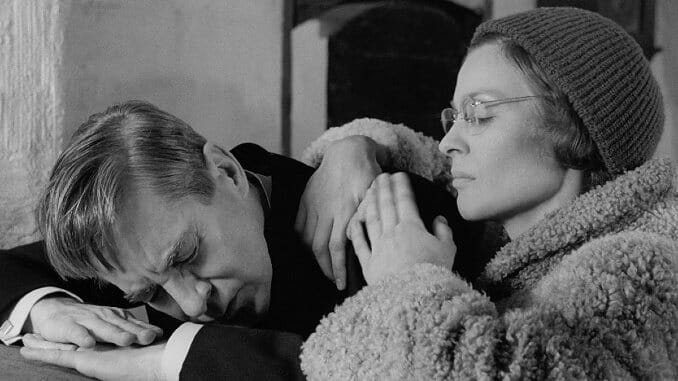Winter Light, Community, and Crisis

There’s no church in barren wastelands, or so it seems there wasn’t much of a church in the Swedish countryside. In a nearly abandoned church in the plains of Uppland, a priest fails a parishioner to an astounding degree. There is no reconciliation, only grief.
In 1963, Ingmar Bergman released Winter Light, the story of an emotionally vacant priest who’s preoccupied with death, while parishioners beg him, to varying degrees, to do his job. At its core, Winter Light is about a failing community and the lack of empathy from its citizens. Tomas Ericsson (the exceptional Gunnar Bjornstrand) is the Lutheran priest grappling with the fact that he doesn’t believe in Christ and realizing he is devoid of any compassion after losing his wife. Ericsson is cold and observant, and his true unraveling begins with the suicide of Jonas Persson (Max von Sydow). Persson is an anxiety-ridden and terrified man, citing nuclear destruction as his cause for distress. Ericsson expresses that he cannot help because he has lost his faith and feels unfit to act as a pastor. Ericsson’s failure causes Persson to accept God’s theorized disappearance and attempt to withhold fate’s power by taking his life.
While Winter Light focuses on Atomic Age apprehension, the film’s themes are as relevant as ever. As we endure another year of a deadly virus and look to our leaders for help, the cries of the people seem to go ignored. The laments of the desperate go unheard while it seems those who are ignorant of the destruction are graced with unwavering faith. During the beginning of the pandemic, we saw working people trying to band together and assist each other in meaningful ways, while some celebrities and other members of the upper crust took to social media to insist that everyone was in this together. There was a massive disconnect between communities, highlighting the privileges of those who could afford to escape reality, or even question it.
Throughout Winter Light, there’s an idea that reflects the teaching of the Christian tradition: Earthly suffering results in a rewarded afterlife; pain and anguish at the universe’s hands are godly—not just one of the unavoidable consequences of existence. Persson’s cynicism is relatable as he questions the understanding of the human condition. He is our darkest thoughts personified. There is a brief scene in which Ericsson and Persson discuss suffering, and how other religions define suffering, and what must be practiced in order to be freed from it. The monologue mentions suffering aiding in belief and strengthening the afflicted. Father Ericsson’s parishes share the same indifferent guidance from the priest, creating a union of pain.
Over the last year or so, we have consistently had to understand sudden extinction. With the climate crisis worsening by the day, the seemingly never-ending pandemic and the blood-siphoning machine of capitalism, there is unrest and unease among young people. With the recent surge in the Omicron variant of COVID-19, those on their way to college are suffering again as they struggle to study. The insurmountable pressure applied by the education system, society and the student loan crisis is crippling their quality of life. Unfortunately, the CDC guidelines for managing the variant aren’t as helpful as most would prefer, with the suggestions now evolving into isolation periods of five days.
This sudden change in guidelines has many upset because it puts people at risk. With sick workers deciding if they should isolate without pay, or continue working, we are entering a late-stage capitalism battle royale. The lack of leadership, allowing managers to make the decisions about the physical well-being of workers, is a direct consequence of trying to maintain a wealthy state that prioritizes the interest of CEOs—not just with the ongoing pandemic, but with how we address climate change. While working people try to personally manage the pandemic, they are also being bombarded with the inevitability of climate change and the ramifications of the mistakes made.
A recent Netflix film satirized the political dysfunction around climate change. Climate anxiety is one of the latest stressors of modern life that impedes the mental wellbeing of youth. A recent study found that 75% of young people feel anxious about climate change (59% very or extremely worried, 84% at least moderately worried). Over 50% felt sad, anxious, angry, powerless, helpless and guilty. Over 45% said their feelings about climate change negatively affected their daily life and functioning, and many reported a high number of negative thoughts about climate change. Respondents rated the governmental response negatively and reported greater feelings of betrayal than of reassurance.
Observing the lack of infrastructure needed to maintain a healthy society, lack of climate change policy and the ever-fluctuating economy where the cost of living keeps rising, it’s easy to feel overwhelmed. The reality of the situation is entirely horrific, and it seems that on some occasions the wellness of the youth is secondary to “progress.”
I know 2 19 yos who died by suicide in the past 2 weeks alone. What are we doing? Why aren’t we using this moment to disrupt the system & give our kids better quality of life so they want to live? What is this all for? How do we give them their hope back? 6
— Allison Slater Tate (@AllisonState) January 6, 2022
A year of isolation. Three years of “15 days to flatten the curve,” bleaching groceries and scrubbing our skin raw to avoid endangering ourselves and others, trying to keep up with the medical advice and new episodes of primetime television to distract from the ongoing disasters. It’s hard to understand the callousness extended to us. There is an exhaustion that can’t be slept off or over-caffeinated away.
-

-

-

-

-

-

-

-

-

-

-

-

-

-

-

-

-

-

-

-

-

-

-

-

-

-

-

-

-

-

-

-

-

-

-

-

-

-

-

-








































